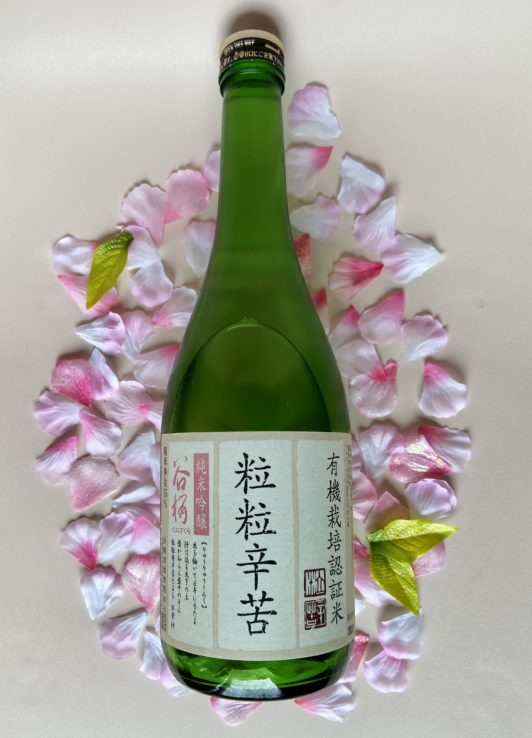Sake Splash: Tanizakura Ryuryushinku
Double, double toil and trouble.
Welcome back to Sake Splash with Eda!
Today we will be drinking in (pun intended) the history and philosophy of Tanizakura Shuzo (谷桜酒造) while getting to know their delightful junmai ginjo, Tanizakura Ryuryushinku. This sake is quite new to the market and might be a little difficult to find at the moment, but if you ask around enough it could inspire some of your favorite restaurants to start carrying it 😉
The History
Tanizakura brewery is located in the southern foothills of Mt. Yatsugatake in the Yamanashi Prefecture of Japan. The brewery first got their start in 1848 by producing sake used as shrine offerings. Around this time, a large amount of antique coins were found on the property, leading the store to be affectionately called furuzeniya (古銭屋) or the old coin shop. The brewery honors its roots by sprinkling yen-inspired decor around its buildings.
Photos: Toshio Ueno
The Philosophy
Kai no Jizake // 甲斐の地酒
Tanizakura believes that sake evolves alongside food culture and strives to create delicious sake that embraces this idea. The brewery brings harmony to the things that change (people, tastes) and things that don’t (soil, water) when brewing their sake. Tanizakura places heavy emphasis on using pure spring water and organically grown rice to yield sake that is both people-friendly and nature-friendly. Their motto is “kai no jizake” (甲斐の地酒) or worthy artisan sake. Imagine the labor-intensive steps of sourcing and growing their organic ingredients, the careful attention placed on the brewing process, and thought put into shaping the sake’s flavor. All of these things are bottled into a Tanizakura sake, a sake worth their meticulous effort.

Photo: Toshio Ueno
Speaking of effort, their junmai ginjo Tanizakura Ryuryushinku embodies that very philosophy and motto. Ryuryushinku (粒粒辛苦) is a Japanese four-character idiom meaning toil and moil, painstaking labor or relentless hard work. The name of this sake comes from a Chinese poem from the Tang Dynasty called Pity the Farmer by Li Shen. Ryuryushinku is a sake that reminds us that we often take for granted each grain of rice we have in our bowl. This sake is a tribute to every grain of rice produced by the sweat and long, hard labor of a farmer. But not all recognition is lost! This sake has placed in the Hong Kong International Wine and Spirits Competition in 2017 with a Bronze and in 2016 with a Silver.
The Sake
Tanizakura Ryuryushinku comes in a sturdy washi-textured box, holding an attractive 720ml (24.34 oz) green bottle inside. The labeling on the box and bottle feature the poem, Pity the Farmer, and are simple and rustic in design, reminding us of life on a farm. Let’s uncap this bottle and honor the farmers and brewery for creating something we can share and experience together!
This is not your typical junmai ginjo. This sake is prepared using 100% organically grown Yamadanishiki rice from Shiga Prefecture and sits at a comfortable 15% ABV. At a polish ratio of 55%, I had expected Ryuryushinku to be fruity and delicate but it had a lot more substance than anticipated. Visually, it is clear and slightly tinted a soft cream color. The aroma is comprised of dried shiitake mushroom, earthy rice grain, and gentle wafts of violet. In the mouth, it feels light, round, and creamy with a medium body to it. This sake has a soft dryness upfront that sharpens up on the finish. Furthermore, this sake pairs well with a variety of dishes due to its mild aroma and refreshing taste. Specifically, this sake would go hand in hand with homestyle Japanese staples. Think of fresh steamed white rice, pickled vegetables, grilled fish, and dashimaki tamago, foods you might spot on a farmer’s table. If you find yourself at an izakaya, try this sake with tempura and salted yakitori. Ryuryushinku is sake that whets the appetite and encourages you to eat more during your meal because it pairs so well with food! I can imagine myself having this sake anytime, all the time.
Next time you sit down to a meal, we hope you have a bottle of Tanizakura Ryuryushinku nearby but even if you don’t, remember to give thanks to the wonderful farmers and hard workers who help put food on your table. We’ll drink to that, cheers!
Please drink responsibly and we’ll see you next time on Sake Splash…
return of Tanizakura!









Comments